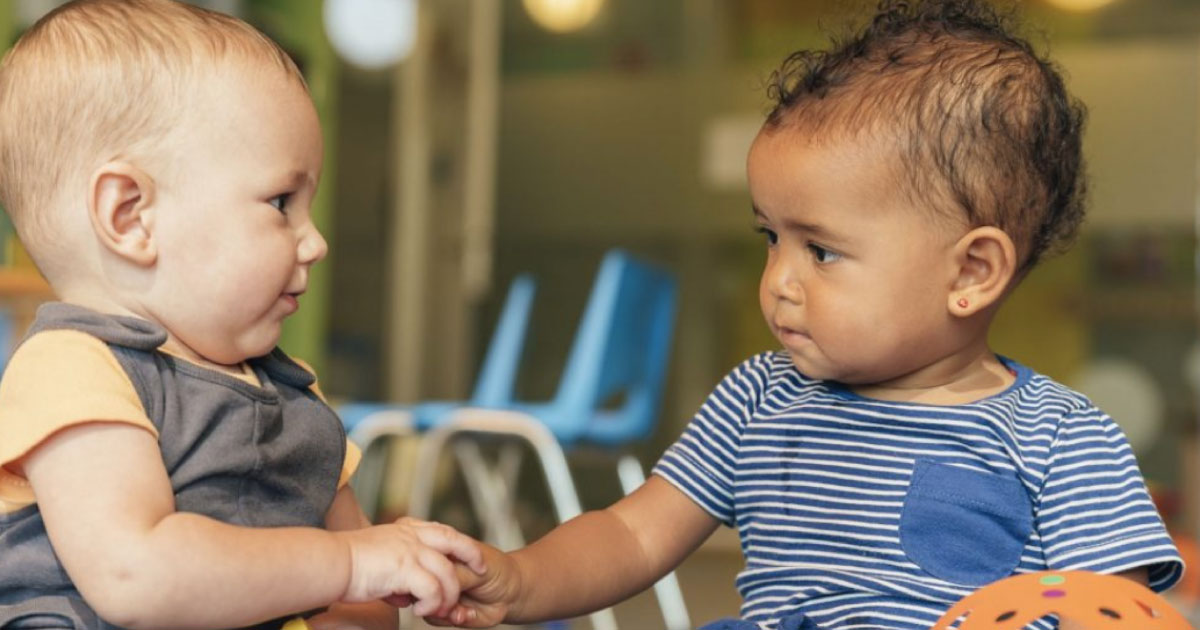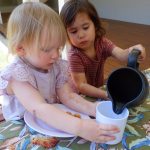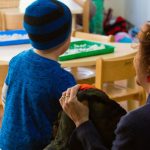‘Early learning matters for babies because babies are learning All. The. Time.’ DR. ANDI SALAMON highlights the importance of early education for babies and the complexities behind it.

I recently sat down in a room with seven babies in it. I was unfamiliar to these babies. Five out of the seven stared at me for about five minutes straight, some of them deadpan. Babies are often direct, clear and purposeful in their communications, but, in early childhood education (ECE), and in society, negotiating spaces with our youngest children remains most challenging. Babies can be underestimated, misunderstood and left out of decisions affecting them, though according to the United Nations Convention on the Rights of the Child (1989) they have equal rights for participating in those decisions and accessing quality early childhood education (Salamon & Palaiologou, in press).
The challenges of promoting early learning for babies are complex, grounded in:
- deeply held beliefs about their place in society,
- the stronghold of classic ideas about baby care and routines as central to working with them,
- an ongoing struggle to know what to ‘do’ with babies.
(Stratigos & Salamon, 2019).
These challenges are compounded by policy and practice landscapes that seem to reflect (and perpetuate) little value for, and low status afforded to, babies and early childhood education with babies. For example, in ECE settings it is common to routinely place four-year trained university qualified teachers in older age groups rather than with the youngest (Stratigos & Salamon, 2019), where, arguably, the most passionate, sophisticated and knowledgeable educators are needed. This is because humans learn more in the first three years than they ever will again.
Babies’ earliest learning begins in utero. By birth they are primed sensory beings, able to adapt and actively participate in the world around them. Designed to connect socially—in safe social and emotional environments—babies are quick to engage with the adults around them, using a range of sophisticated emotional communication. As eager social ‘infant clowns’ (Reddy, 2001; Trevarthen, 2004) six to seven month olds will glee in engaging you with their repertoire of social silly. Blinking, crinkling eyes with exaggerated smiles (Salamon, Sumsion, & Harrison, 2017), pretending to laugh, cough, sneeze and hiccup, babies actively engage in and guide play based social and emotional learning. Early learning matters for babies because babies are learning All. The. Time.
What babies learn about connecting with others and expressing emotions helps develop dispositions that underpin healthy emotional and social wellbeing. These dispositions are explicit in the early years curriculum, where it is hoped that children are effective communicators, connect with and contribute to their world, are confident and involved learners, and have a strong sense of wellbeing and identity (Department of Employment, Education and Workplace Relations, 2009). The business world calls these ‘soft skills’ and primary education calls it the ‘hidden curriculum’. The early social and emotional skills babies learn, some of which they are experts at by one year old, are the foundations of all other development, and, so, future academic and life success. If early learning matters, start with the babies!
Early Learning Matters Week 2023 is from 24 – 28 July 2023. Click here to find out more, get involved and sign up to receive regular updates.
References
- Department of Education, Employment and Workplace Relations (DEEWR). (2009). Belonging, being, and becoming: The Early Years Learning Framework for Australia.Canberra, Australia: Commonwealth of Australia. Retrieved from https://docs.education.gov.au/system/files/doc/other/belonging_being_and_becoming_the_early_years_learning_framework_for_australia_0.pdf
- Reddy, V. (2001). Infant clowns: The interpersonal creation of humour in infancy. Enfance, 53(3), 247-256.
- Salamon, A., & Palaiologou, I. (in press). Infants’ and toddlers’ rights in early childhood settings: Research perspectives informing pedagogical practice.In F. Press & S. Cheeseman (Eds.). (Re)conceptualising children’s rights in infant-toddler care and education: Transnational conversations. Dordrecht: Springer.
- Salamon, A., Sumsion, J., & Harrison, L. (2017). Infants draw on ‘emotional capital’ in early childhood contexts: A new paradigm. Contemporary Issues in Early Childhood, 18(4), 361-374.
- Stratigos, T., & Salamon, A. (2019).”What are babies meant to do with clay!?”: Interwoven identities and their impact on quality pedagogy with infants and toddlers. In A. Salamon and Chng (Eds.). Thinking about Pedagogy in Early Education: Multiple early childhood identities. Routledge: London
- Trevarthen C (2004) Learning about ourselves, from children: Why a growing human brain needs interesting companions. In: Trevarthen C (Ed.) Perception in action publications. Scotland: University of Edinburgh, pp. 1–36.
- United Nations (UN). (1989). The Convention on the Rights of the Child.Geneva, Switzerland: Defence International and the United Nations Children’s Fund.
Connecting with babies
Research in Practice Series title
By Marilyn Fleer and Pam Linke
Connecting with babies is for all who are entrusted with the care of babies in their first year or so. It is an invitation to us to focus on ourselves and our interactions and relationships with babies and to think about how we provide the right environments that support their development and learning and build strong foundations. Purchase your copy here on the ECA Shop here.












Have always kept education as a priority for myself then my kids. A great and interesting read Dr. Andi!
Hey Dr Andi. An interesting read. I am still wondering however, whether early learning for babies needs to happen in a care setting or whether the same results can be achieved via a carer at home? I understand the impacts for vulnerable kids and when kids get older because of the social benefits that peers provided.
Hi Dr. Salamon,
I am working on my dissertation proposal and included information from your publication, Infants draw on ‘emotional capital’ in early childhood education contexts: A new paradigm” but can no longer use it in my Lit. Rev. because my end date has been pushed back a bit. My Chair suggested I reach out to you, in hopes that you might be willing to point me in the right direction. I have looked at several articles that cited your original article in 2017, but am not finding anything really similar. I might also be overlooking it. Is there something newer I can reference that includes information on infant communication with caregivers?
I appreciate any help you can offer!! I really liked the article and am looking for additional sources:)
Thanks for the discussion in such an important space. I note your comment “ For example, in ECE settings it is common to routinely place four-year trained university qualified teachers in older age groups rather than with the youngest (Stratigos & Salamon, 2019), where, arguably, the most passionate, sophisticated and knowledgeable educators are needed. This is because humans learn more in the first three years than they ever will again” I ask, what is in the degree that makes this the case. The last 2 candidates I interviewed for the age group with the degree had no background in 0-2 years physical development, no learning on peri-natal care, no learning on parent support and none on nutritional progression in 0-2s. I have employed a wide range of qualifications in the past including OTs, child health nurses and degree qualified teachers with post grad quals relative to the age group, and wonder if the best degree for 0-2 s is yet to be offered in Australia and that a multidisciplinary degree is desperately needed. I finish by saying that ‘passionate’ and ‘sophisticated’ are not course related. Your thoughts?